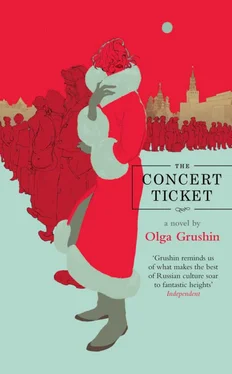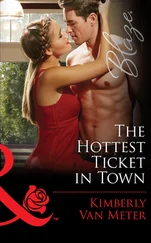The man was half a block away now, almost invisible, a denser darkness in the dark, but his words sliced sharp and angry through the empty street: “Nobody knows, woman! Why don’t you wait in line yourself if you’re so curious?”
Exhaling, Anna gathered up her bags and walked through the snow, raising small sparkling flurries with each step. At the corner, the mad old man from her dream sat on the curb, drawing some glowing symbol in the air with the burning tip of his cigarette; she smiled absently as she passed him, was smiling still as she unlocked her door.
She spent the next few days distracted, moving mindlessly through her chores and routines. On Sunday night, the night before the kiosk was set to open, she lay in bed unable to sleep, watching rare headlights stumble over the lump of her slumbering husband, thinking of the day, five, no, not five, seven years ago now (they had been celebrating Three Glorious Decades since the Change, and the city had shaken with garlands of festive flags mauled by the November wind)—the day when she had brought home the square tin box.
There had been a picture on the lid—an elephant under some exotic-looking, richly embroidered cloth in vibrant red and yellow patterns. She had hesitated to open it for the longest time, sitting alone at the kitchen table, cradling the box in her hands under the feeble glare of the lightbulb. At last she carefully slid the edge of a knife around the lid to loosen it, then prodded it free, releasing that dry, dense, delicious fragrance that did not smell of anything exactly and yet, she found, seemed to contain within it a wealth of other smells. They tumbled one after another into the cramped kitchen—the bright watermelon aroma of a chilly sunrise in the country in May, the intoxicating daffodil sweetness of a full-mooned June evening, the grassy ripeness of July on the veranda of a light-walled house tipping into the blue well of the night on a wave of laughter.
Funny, she thought, how her memory kept the smells, kept them perfectly, collected them like precious, rare specimens laid out on the black velvet lining of its few secret drawers, ready to spill its darkly glittering secrets whenever a long-forgotten smell sprang its lid open. Her mother had rented that house the last summer before the Change. There had been other children there, neighbors, friends. In an immediate, breathless rush, she recalled spoons clicking against cups, and the charmed, weightless leaps of the sad melody her mother had played so much on that funny rickety piano as their guests gathered for tea. Anna had never had an ear for music—indeed, she did not even like music all that much, she preferred the quiet—but this melody was special, it was sad and simple and special, and every time she had heard it, it had been as if someone’s cold, agile, silver-tipped fingers had slid swiftly up and down the clavichord of her spine.
She tried to hum it as she bent over the tin box with the elephant on its cover, but the tune proved elusive. Then the floor creaked, and her mother was looking at her, her eyes quiet, her long, painfully thin fingers pulling the purple velvet of her old robe tight at her throat. Anna struggled to empty her face of all traces of happiness—and then her mother spoke.
“Real eastern tea, how nice, shall we have a cup together?” she said in a casual, even voice, quite as if she spoke to Anna all the time, quite as if she had not maintained an aloof, maddening silence for so many years—and Anna felt that she had been granted permission to keep the happiness on her face just a while longer, and had to turn away and stare at the impossibly straight silhouette of her mother in their kitchen window, to hide the sudden welling in her eyes.
She had saved the box after the tea was gone, of course. Every so often, when sure that no one was watching, she would open it and press her nose against its cold metallic insides and breathe, and breathe, and try to remember; but no new memories came, the music did not distill into a clearer melody, and after some time, her mother reverted to her habitual thin-lipped silence. In another year or two Anna filled the box with an assortment of mismatched buttons. Her son had impatient fingers and was always pulling buttons off his clothes.
On Monday morning, she did the unthinkable: she rang her school and sneezed into the phone. “Oh yes, there’s a flu going around,” said the secretary sympathetically. “Emilia Khristianovna’s sick also. Squeeze a lemon into hot water.”
“I will,” Anna lied, and dressed quickly, then extracted the family’s savings from inside a sock in the bureau’s bottom drawer (just in case, one never knew, it might be something pricey), and walked out, pressing her handbag to her chest.
It was early, but some thirty or forty people already stood before the kiosk. One of them, a stocky woman in felt boots, rather resembled the physics teacher, but a garish knit scarf obscured her face, and Anna was not sure. She pulled her own scarf closer to her eyes all the same; then, opening the book she had brought along—the latest collection by the country’s most honored poet, whose work she frequently assigned to her pupils for memorization—she began to read, forming the words half volubly, a teacher’s habit:
The works of cruel gods
In ruins lie.
Above the crumbs of columns
Swallows fly.
And men are joyful
Slavery to avoid.
Where mighty temples stood
Now lies—
“Ah,” said a voice behind her, “here already? Mind if I join?”
Today her lipstick was an unbecoming shade of orange, Anna noted with spite.
“You shouldn’t be cutting in front of anyone,” she said. “The end’s over there.”
The line was swelling rapidly.
“Fine, I wasn’t asking you for a favor anyway,” the woman announced airily, and walked off with a haughty click of her elegant earrings.
“I hope they run out of it just before your turn!” Anna cried, and, just as the squat woman who might or might not have been Emilia Khristianovna appeared to twitch in her direction, hastily hid behind her volume, embarrassed already by her unlikely outburst.
For an hour or two she tried to read, but found the poems difficult to like, whether because she could not concentrate or for some other reason. As the morning condensed into a dreary afternoon and the strengthening wind started to throw heavy hours back and forth like smudged, icy snowballs, she shut the book decisively and stood still, listening to conversations rise and collide and fade around her. People argued about the unknown merchandise at the end of their wait; every so often someone abandoned the line after much complaining; others joined. Anna soon gathered that over the past two months the kiosk had become a neighborhood obsession. It had appeared in the fall, but, unlike other local kiosks, which, regularly and with no secrecy, dispensed cheap cigarettes and vegetables or, on thrilling and brief occasions, chocolates and cosmetics, this kiosk had never sold anything at all, not even on those rare days when a fake blonde with a pasty face made surly appearances in the kiosk window. The woman would answer no questions, thereby deepening the general suspicion of some momentous mystery. As weeks went by, speculation and agitation only mounted. Rumors had spread; people whispered of imported crystal or ingenious toys or exclusive book subscriptions, or tickets for a new State lottery in which one could win an automobile or a vacation by the sea. An enterprising man had recently begun to take bets on the day of the week and the time of day when the nebulous something would finally go on sale. There were, of course, a few nonbelievers—“cynical, dried-out souls,” a man behind Anna grumbled—who predicted it would turn out to be something pathetic, say canned soup or matches, and who often came by the line to mock the trusting fools freezing off varied pieces of their anatomy; but many of those who lived nearby made it a habit to spend at least a couple of weekly hours at the kiosk, just in case. A handful even arrived by tram from farther out, and there were not a few, among housewives and pensioners, who waited daily. And the more Anna heard, the more filled she was with a sure presentiment of a change, whether small or boundless she did not know—but in any case, something, she thought, to make her and her family happier, or lend some simple beauty to her everyday life, or perhaps even infuse her entire existence, working into its minute cracks and voids, knitting it into a tighter, brighter, fuller fabric.
Читать дальше












